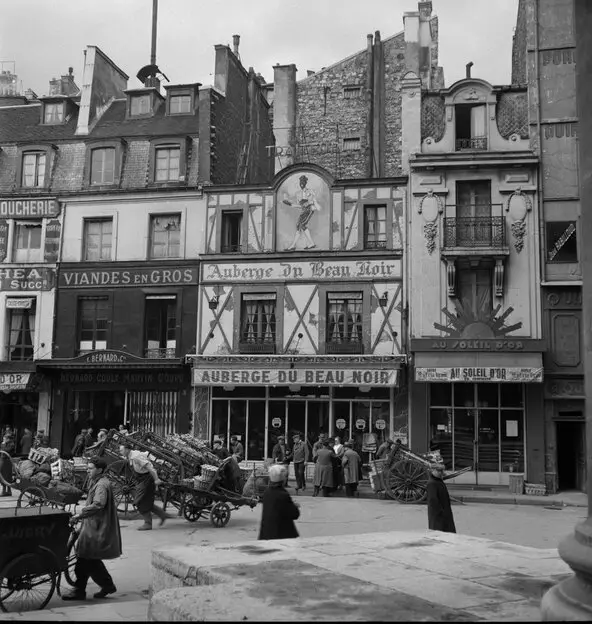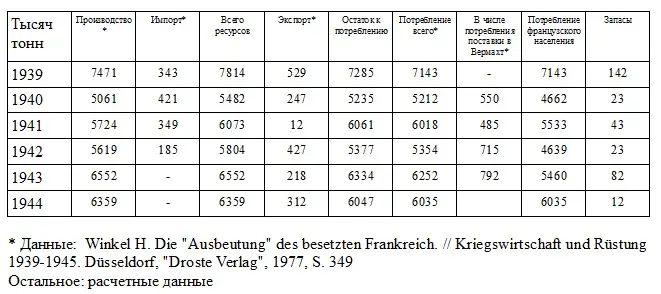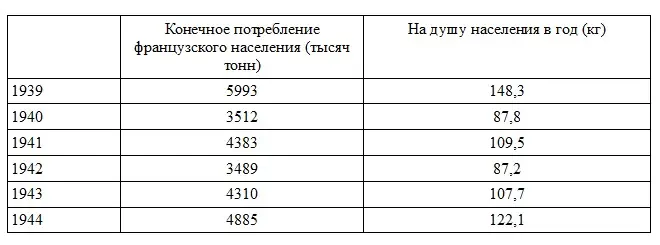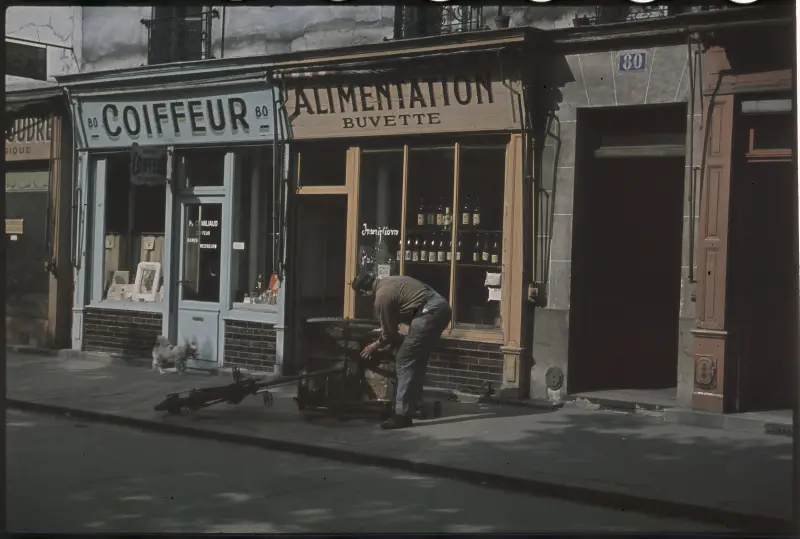Malnutrition and underdrinking in France during the occupation

Household photographs from the war are difficult to find. So enjoy the views of Paris
This topic arose, so to speak, at the request of workers who were very interested in the situation with agriculture in occupied France. Because the picture is often drawn that France supplied the German army with all sorts of delicacies: cheeses, wines and other things, from which one could conclude that there were no special agrarian problems there.
However, this was not entirely true. There were problems, and very serious ones.
Falling harvests
French statistics are good here too. The Ministry of Agriculture of the French state (that is, the Vichy government) annually issued a detailed report on the harvest, and in a standardized form that ensured comparability of data. Each such report contained detailed information not only on all crops cultivated in France, as well as on livestock products, but this information was given for all 87 departments of the country.
From these statistics you can find out exactly how much arable land there was in which department, how many crops were planted and what kind of crop was harvested. A monetary estimate of the value at current prices was also given.
We are, of course, interested in general data on, say, wheat, one of the main breads. These data show that wheat yields fell sharply during the war years.
• 1939 – 7 thousand tons;
• 1940 – 5 thousand tons;
• 1941 – 5 thousand tons;
• 1942 – 5 thousand tons;
• 1943 – 6 thousand tons;
• 1944 – 6 thousand tons;
• 1945 – 4 thousand tons.
The reasons for the fall in wheat yields, as well as for all other crops for which the picture is the same, are simple, but very indecent. Even though France loved to teach others how to live, the French peasant did most of his plowing on horseback. In 1940, there were 39 thousand tractors in France, of which 25 thousand were in use and plowed about 2 million hectares or 10% of all arable land.
There were fewer horses during the war years. If in 1938 in French agriculture there were 2,1 million horses over three years old, that is, workers, then already in 1940 there were 1,6 million. During the occupation, their number increased slightly to 1,7 million heads, but in 1944 year fell again to 1,6 million heads. During war, the mobilization and requisition of horses is commonplace. But French agriculture, having lost 23% of its livestock, naturally reduced plowing and production.

During the war years, even in Paris there were charioteers
Another reason is poor supply.
In 1938, 164,5 thousand tons of steel were spent on the production of agricultural implements and agricultural machinery, and in 1944 - 27,6 thousand tons. The situation was more or less prosperous in 1940–1942, when metal consumption reached 120 thousand tons. But in 1943 it was sharply reduced to 45 thousand tons, or 3,6 times less than before the war.
This is a factor. Plows, harrows, cultivators - all of this wears out, and quickly. The soil wears them down like an abrasive. Therefore, if enough agricultural implements and tools are not supplied, then after a couple of years it turns out that the peasant has nothing to plow with - his plow has worn out.
It's the same with skin. In 1938, agriculture consumed 3 tons of leather. Then supplies were cut by more than half until they fell in 950 to 1944 tons, or 995% of pre-war requirements. Skins are a harness, without which, like without a plow, it is impossible to plow.
To this should be added a significant reduction in the labor force in French agriculture. And then you will get a typical picture of the depletion of agriculture, which was affected by a shortage of labor and draft power, wear and tear of equipment, which inevitably led to a reduction in crop production.
The Vichy government, of course, tried to correct the situation, but its capabilities were clearly not enough to raise the French peasantry to the pre-war level.
Starvation ration
Since we have statistics on production, consumption, exports and imports, as well as wheat supplies to the Wehrmacht, we can do something like a balance and estimate how much bread the French had left during the war years.

The table is compiled according to German data, which differs somewhat from the French, but not by much. At the same time, German statistics provide other data that allows one to assess the distribution and consumption of wheat.
But there is an important nuance here.
French statistics indicate that before the war the volume of seeds needed for sowing was 1 thousand tons. This volume must be subtracted from the total consumption of the French population, which amounted to about 150 million people during the war years. And then the following will happen:

On average per capita, 87,2 kg per year is 238,9 grams of wheat grain or about 250 grams of baked bread. In 1942, France had supply standards according to which adults were entitled to 275 grams of baked bread, 12,5 grams of pasta, 126 grams of potatoes, 30 grams of meat, 17,3 grams of sugar per day.
In general, starvation rations.
France is a country of drinkers
They may say that there was a lot of wine in France. Well, yes, French wine is often mentioned on any occasion. However, statistics show that wine suffered the same fate of falling production.
• 1939 – 69 million hectoliters;
• 1940 – 49,4 million hectoliters;
• 1941 – 47,5 million hectoliters;
• 1942 – 35 million hectoliters;
• 1943 – 41 million hectoliters;
• 1944 – 44,3 million hectoliters;
• 1945 – 28,4 million hectoliters.
This is despite the fact that wine consumption in France in 1938 was 48,9 million hectoliters or 4,89 billion liters. On average, there were 119,2 liters of wine per year per French person, including babies and old people, or 326 grams every day. Roughly - half a bottle. A country of drunks. In such a country you cannot prepare a lot of wine for the occupiers. No Gestapo could take away their coveted bottle from the French.
In 1940, the grape harvest and wine production were no longer very good, but the French found themselves and drowned out the bitterness of their defeat not only with their own, but also with imported wine - 9,5 million hectoliters. Most likely Spanish.
But already in 1942, the import of wine stopped, their harvest was bad, so the slightly sobered French began to look askance at the invaders. It is possible that this circumstance played a significant role in the development of the French resistance.

Parisian liquor store window
As far as one can judge, wine was supplied to the occupation administration, the Wehrmacht and Germany mainly by large vineyards or wholesale companies for which it was a profitable business.
Thus, it turns out that France seems to be a big country. But it turned out that the amount of agricultural resources that could be obtained from it was very limited. Already in 1940, agriculture had declined greatly and could not provide large food resources for Germany. Even our own needs had to be cut by more than 30%.
The French, like throughout the rest of Europe, were already severely malnourished during the war.
However, they had to starve thoroughly after the end of the war. In 1944, in contrast to the lightning campaign of 1940, which took place in the very north of France, fighting spread throughout almost the entire country, and in some places it was protracted and destructive.
Therefore, from the point of view of the economy and food supply, 1945 turned out to be the worst year for France, and the republic was really on the verge of serious famine, aggravated by a shortage of booze.
Information